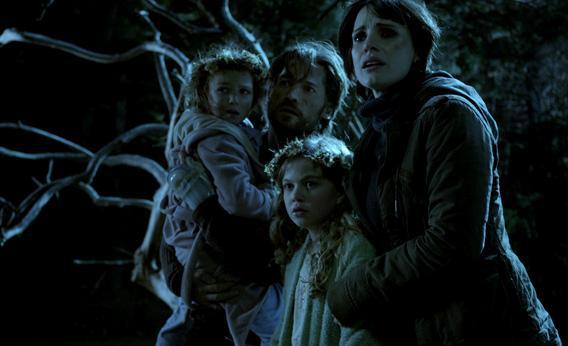Now that Mama has been in theaters for a few weekends, I think it’s safe to take the film to task without incurring the wrath of the spoiler police. Mama’s the latest movie that Guillermo del Toro has lent his name to—though strictly as an executive producer. Directed by Andres Muschietti, the film is a dark elaboration of a short film by the same name Muschietti directed with his sister in 2008.
The plot’s simple enough: Two missing girls end up in a cabin in the woods and are raised by a benevolent, if vicious, ghost-demon-thing that bears a striking resemblance to a Modigliani painting. Years later, the girls are found and taken in by their freelance-artist uncle (Nikolaj Coster-Waldau) and his punk-rock girlfriend (Jessica Chastain). This infuriates their ghost-protector, whom the girls call “Mama.”
Cue custody battle.
Quite quickly the girls’ uncle, the only person who held hope of their survival five years after their disappearance, is attacked by Mama and left in a coma. The movie’s only other male character with a speaking role, a well-meaning but annoying child psychologist (Daniel Kash), suffers a similar fate. So halfway into this horror film, we’re presented with an all-female cast. This is kind of a big deal.
To its credit, Mama sidesteps a number of tried and true horror-movie tropes usually in effect when female leads are present. Chastain, who excellently pulls off the nonchalant, anti-aunt thing throughout, is sexualized all of maybe once when she and her boyfriend decide to have a passionate kiss. Chastain catches a glimpse of Mama in the mirror, and that’s the end of sex for the rest of the film. And the film never portrays Chastain or the girls—8-year-old Victoria (Megan Charpentier) and 4-year-old Lilly (Isabelle Nélisse)—as abnormally scared or weak. Sure, when Mama’s oozing from the walls or seething from beneath the bed, they let out a few screams, but really–wouldn’t you?
So it seems that Mama wants to subvert the horror genre’s problematic relationship with women by featuring an ensemble of actresses who are neither overly eroticized nor particularly delicate. But on closer inspection, Mama’s backstory reads like an unfortunate cautionary tale about hysterical women from the 19th century: She is the ghost of a woman from an asylum who long ago stole her own baby, killed a bunch of people, jumped from a cliff, and became a wandering spirit in search of surrogate children to satisfy her everlasting maternal desire. Gender theorists might call her an embodiment of the monstrous feminine—a well-worn horror cliché that conceives womanhood as revolting, threatening, or taboo. Essentially, Mama’s just a crazy lady who can’t let motherhood go.
And she’s not the only character limited by the film’s somewhat reductive view of women. Why does Chastain insist on fighting a monster that’s ripped people’s heads apart for two girls she barely knows? How much more terrifying might things have been if Chastain’s character said, “Hey, I’m not the nurturing type” and left the girls to fend for themselves?
